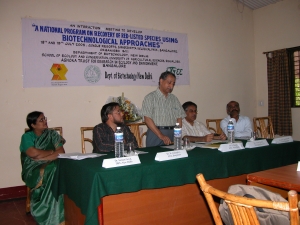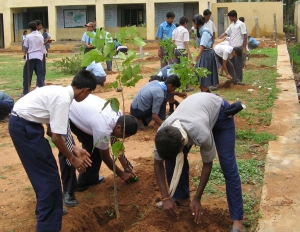|
|

|
ATREE Delhi, in collaboration with the Ministry of Environment and Forests - Government
of India, conducted the 1st Vacation Programme on Natural Resources (VPNR). The program
selected forty 11th- standard students from various schools located in the National Capital
Region, Chandigarh, and adjoining districts of Haryana and Punjab. The program was
inaugurated on 16th May by Ms. Meena Gupta, Additional Secretary, Ministry of Environment
and Forests. Dr. R. Mehta, Adviser to the MoEF and Dr. Kamal Bawa, President of ATREE,
addressed the participants on the occasion.
The first VPNR module lasted three weeks and was held at Delhi and Solan. This module
comprised a creative mix of interactive lectures aimed at sensitizing participants to
some key issues related to sustainability and conservation of natural ecosystems.
Eminent speakers from a range of esteemed institutions active in the field of natural
resources management were invited to share their rich perspectives and insights.
During the first module, the participants also visited some of the leading institutions
conducting cutting-edge research on natural resource management and conservation,
such as: the National Bureau of Plant Genetic Resources, New Delhi, the Central Soil
Salinity Research Institute, Karnal, the National Dairy Research Institute, Karnal,
Y.S. Parmar University, Solan, and the Central Potato Research Institute, Kufri.
The week-long, second module was carried out in collaboration with BioDCS, Government of
Himachal Pradesh, and SAHARA, a local NGO. This second part of VPNR was a hands-on exposure
camp in the Great Himalayan National Park.
The primary objectives of VPNR were to develop a core of young citizens who are aware of
the challenges related to natural resource management, as well as to create a new young
constituency of support for conservation efforts. The participants who found the program
especially exciting will now work on individual assignments. In September, they will
reassemble in Delhi to make presentations with their new insights. The program will
conclude with a valedictory function, also planned in September, 2005.
-Vishakha Das
A co-ordination meeting was held between the Karnataka Forest Department, ATREE
and Vivekananda Girijana Kalyana Kendra (VGKK) on 28th May 2005, at ATREE's BRT
Field Station. The purpose of the meeting was to arrive at a coordinated plan
of work for BRT in which all three agencies complement each others' work. Each
of the three agencies made presentations summarising their work in BRT. The
Forest Department appreciated ATREE's presentation outlining their research
findings and future plans. VGKK's work with the Soligas was also shared, and
there was discussion on some future possibilities of working with the Tribal
Federation and mobilising Eco-Development Committees for anti-poaching
activities. The Forest Department presented the management challenges for
BRT and held discussions on certain tenure questions and the possibility
of voluntary relocation. There was also rich discussion on changes required
in Large-scale Adivasi Multi-Purpose Societies (LAMPS) inside BRT, as well
as the LAMPS of neighbouring areas outside BRT. The most significant outcome
of this meeting was that as a result of the valuable long-term inputs from
VGKK and ATREE, the BRT Wild Life Sanctuary (BRT WLS) Advisory Committee
was formed comprising ATREE, VGKK and the Forest Department. This advisory
committee will meet regularly to provide inputs for the management of the
park. This unique venture, working toward collaboration in protected area
management, was welcomed by all.
-Bansuri Taneja

ATREE, in association with the Department of Biotechnology (DBT), New Delhi and the
School of Ecology and Conservation at the University of Agricultural Sciences,
co-organized a two day meeting: A National Program on the Recovery of Red-Listed
Species Using Biotechnological Approaches. The meeting took place from July 18th
to 19th 2005, at the Jungle Resorts, Bannerghatta Biological Park, Bangalore. The
workshop aimed to identify the species that require immediate attention, and to
develop a comprehensive program for their recovery based on existing programs
and efforts.In advance, scientists received copies of the Red List of plant species, separately
developed by the IUCN, Botanical Survey of India, Kolkata and Foundation for
Revitalization of Local Health Traditions (FRLHT), Bangalore. Several experts
presented concept notes on the recovery of selected species that could be taken
up under this program. It was felt that the IUCN categories, "rare", "endangered",
and "threatened" (RET), are subjective. Participants felt that comprehensive
baseline data needs to be generated for some species before including them in
the recovery program.
While summing up the workshop, Dr. K.N. Ganeshaiah suggested compiling a general
consensus list of species for the program, as well as several more specific
categories, and to include many examples for each category. The consensus list
of species was considered at length, and 12 plant species and 2 insect species
were finally selected to be included in the recovery program. Experts from
six institutes were identified to develop preliminary proposals for the recovery
of these species. Utilizing appropriate biotechnological tools, such as molecular
markers and tissue culture techniques, is being considered for the recovery
of these species.
Additionally, participants decided to obtain a list from the Botanical Survey of
India, Zoological Survey of India and other institutes, of 30 species of plants
and insects that might require recovery efforts. This list, along with the
workshop list, is announced in Current Science (Vol. 89, No. 4, page 599-600)
and the DBT website. Experts are invited to offer feedback regarding the
ranking of species, after which a fresh list of species will be developed
for the recovery program.
A total of 30 participants attended the meeting, including scientists and forest
officials from various institutes and states.
-Dr. Mohan, G.S.

On July 8th 2005, the Ashoka Trust for Research in Ecology and the Environment (ATREE)
joined efforts with Development Alternatives, a non-profit research, development, and
consultancy organization, in a planting program. This was carried out as a part of
their environmental assessment, awareness, action, and advocacy program. Around
50 students from 5 different urban schools, teachers, and ATREE representatives
traveled to the rural government high school, Maralwadi, in the Kanakapura region.
There they were joined by 25 school students of the Government High School. The
students were informed of the importance of planting native species, their uses,
and how to plant and protect them. Together, the students then planted and fenced
75 saplings of 6 different native species. The local students and teachers were
given instructions on caring for the seedlings and promised to do their best to
"green" their campus.
The urban students were very enthusiastic and returned home with a new appreciation
for the natural environment. The rural school children were also very excited to meet
children from Bangalore and receive help in planting saplings on their campus.
This project was possible thanks to donated time and volunteers from Development
Alternatives and the Ashoka Trust for Research in Ecology and Environment.
-Kavitha A.
Dr. Satya Prakash Mohapatra has joined the Center for Conservation, Governance
and Policy at ATREE-Delhi. He will be looking after ATREE's work in the area of
Production Forestry and Climate Change.
Yogesh Kumar Ghore will be working on issues related to Forestry Taxation in India,
as well as help to expand the activities of the Center for Conservation, Governance
and Policy at our New Delhi office.
Ranjeet Singh Rawat has joined ATREE, Delhi as an accountant.
Sindhu K. joined ATREE, Bangalore as an accountant. Before this, she worked at the
Air Force School, Hebbal for five and a half years.
Nithin Lakshmana completed a masters' degree in Library and Information Science from
the University of Mysore and has been a library trainee in IISC, Bangalore. He has
joined ATREE, Bangalore and will be updating our library database and catalogues.
Kavitha Ramaswamy joined ATREE, Bangalore as a receptionist on May 16. She was working
for small-scale manufacturing company in Bangalore before joining us.
Freeda Maria Swarna will be working at ATREE, Bangalore on issues related to eco-tourism
and NTFPs. She completed her MTA (Master of Tourism Administration) from Bangalore University.
Bawa K. 2005. Editorial: Our survival is at stake. The Times of India, Wednesday,
18 May 2005.
Hiremath, A. J. & B. Sundaram. 2005. The Fire-Lantana cycle hypothesis in Indian forests.
Conservation & Society 3(1): 26-42.
Nagendra, H., B. Karna & M. Karmacharya. 2005. Examining Institutional Change: Social
conflict in Nepal's leasehold forestry programme. Conservation & Society 3(1): 72-91.
Prasad, S., J. Krishnaswamy, & R. Chellam. 2005. Dispersal of seeds that ruminants
regurgitate: Phyllanthus emblica Linn. (Euphorbiaceae) at Rajaji National Park, India.
In: Proceedings of the IV International Symposium / Workshop on Frugivores and Seed
Dispersal. Brisbane, Australia. pp. 101.
Saha S., H. BassiriRad, & G. Joseph. 2005. Phenology and water relations of tree sprouts
and seedlings in a tropical forest of South India. Trees 19: 322-325.
ATREE, Bangalore received a grant from the Sri Lankan Forest Department for
'A study tour for Sri Lanka and Tamil Nadu forest officials, Karnataka.'
Kartik Shanker was awarded a grant from Winrock International India to support
the production costs of the journal, 'Conservation & Society.'
Ravikanth received a grant from the Ministry of Science & Technology, Department
of Biotechnology, to hold, 'An Interactive Meeting to Develop a National Programme
on Recovery of Red-Listed Species using Biotechnological Approaches.'
Savitha Swami, Joyeeta Das, & Soubhadra Devy were awarded a grant from the
Singapore Environmental Council to hold a capacity building programme for
select teachers and students.
Sinu, P.A. was awarded the Ernst Mayr Grant from Museum of Comparative Zoology,
Harvard University to study Indian Carabid beetles deposited at British Museum
of Natural History, BMNH, London in September 2005.
Vishal Sharma received a grant from International Foundation for Science (IFS)
to study 'Hydrological Impacts of deforestation in a southern Indian deciduous forest'.
Jagdish Krishnaswamy received a grant from the Wildlife Conservation Society to
develop and teach a course in 'Applied Landscape Ecology', for a 'Post- Graduate
Program on Wild Life Biology and Conservation.'
Bharath Sundaram has been awarded a research grant from the International
Foundation for Science, Sweden for the study, 'The invasive species-fire cycle
and its implications for the conservation of tropical dry forests.'
ATREE Delhi has been awarded two grants from the Foreign & Commonwealth Office,
Government of U.K.'s Global Opportunity Fund (Climate Change and Energy Program)
for projects: 'The Scope and Role of Production Forestry in Enhancing Carbon
Mitigation in India' & 'Reorienting taxation policies to conserve biodiversity
and promote sustainability of non-timber forest resources.' The projects will
be implemented over a period of 36 & 15 months, respectively, starting 1st
September 2005, by the Center for Conservation, Governance and Policy at ATREE.
|



